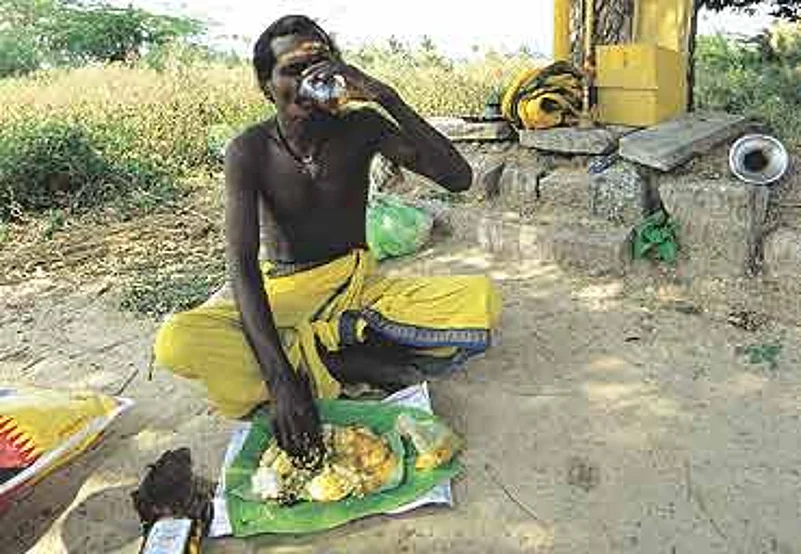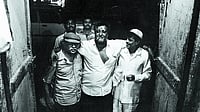The long-locked man is just about five feet tall and an undernourished 40 kg. Clad in a yellow veshti, he lives in the Adi Dravidar (Dalit) Colony, where the roofs of most of the 27 government-built one-room houses have collapsed. Seated on a gunnysack, Arumugam pedals his sewing machine, stitching a green blouse. It’s early on a Friday, and before the clients turn up, he asks us to fetch him two 180 ml bottles of Cosmopolitan whiskey, two plastic glasses, two water sachets, a packet of savoury ‘mixture’, some pickle and five idlis. Of course, the ‘prasadam’ will be of even greater value if you add ganja, pan parag and Ganesh beedi to the list. The man at the state-owned liquor shop 2 km away knows at once: Is all of this for the Snot Swami? he asks.
After a turmeric-scrub bath in a lotus-strewn pond, Arumugam drapes himself in a sari, sits below a tree near the Karuppusamy temple, and elevates himself to a higher plane of consciousness by gulping 360 ml of rotgut whiskey in 40 minutes. "Other swamis hide what they drink, I don’t," he says.
Arumugam makes pronouncements on visa cases, court cases and health problems. However, his speciality is blessing childless couples. He tells Outlook: "I have blessed 5,700 couples with children." It’s a claim nobody can confirm. Or contest. He says he has been rendering this service for more than 15 years, though it is only in the last two years that his fame has spread. "A man on whose kidneys the Coimbatore doctors had given up came to me. I cured him," he says.
On an eventful Friday, more than 100 people—of all castes and communities—seek out the cross-dressing swami. After a few swigs of whiskey, idlis, pickle and tobacco powder, Arumugam is able to generate a great deal of phlegm—and he lets it fly. Snot and spit fly out of his sharp nose and mouth and hit the faces of those seeking his counsel. To wipe it off would be blasphemous. For Snot Swami’s disciples, this is the best way to be blessed. The irony is: If Arumugam was just another Dalit agricultural labourer, people would have refused water from him. Now, they welcome his snot on their faces.
Snot Swami is part of a phenomenon that pervades Tamil Nadu. Tucked away in villages that invariably miss the cartographer’s pencil, their reputations built purely by word of mouth, scores of freaky swamis have been ‘healing’ people with various ailments—mental, physical, social, personal, familial, even political. The social base of their clientele is largely the lower middle class and the rural poor—people defeated by marital problems, by science, modern medicine, the state, life. But once in a while, desperation brings even people in Toyotas and Fords here.
In Lakkayankottai, a village in Ottanchattiram taluq in Dindigul district, Vellachamy maintains a visitors’ ledger in his little ashram. Among those seeking Vellachamy’s counsel is Subramanian, a farmer from Palani, whose inexplicable body pains found no cure in allopathy. "I spent a week in the ashram and found great relief," he says. Selvaraj, a labourer in a rice mill in Dharapuram, says he has been unable to sleep in 10 years: "I have been coming here once a month for the past three years. After each visit, I manage to sleep for 10 days." Pechiammal, from Nilakottai, has been deserted by her husband. The swami, who keeps tossing shells as he speaks to the tormented soul, offers her two juicy lemons, some charmed vibhuti (holy ash), and the assurance that her husband will return soon.

A tailor by profession, snot Swami Arumugam blesses people with Phlegm
Mangeswari has not seen her truck-driver husband in 18 months. Eyes closed, Vellachamy infers from this piece of information that he has been living with another woman. The cure is the same: two lemons, holy ash. "Dindigul is known for good lemon crops and ash is purchased from shops," Vellachamy’s assistant, who maintains the ledger, explains pragmatically. Why the ledger?
"The TN police wants to find out if we sexually abuse women who visit. They even sent women police in mufti. The ledger is to keep a record," explains the 58-year-old swami with a rationalist past. He used to be a member of the Dravidar Kazhagam and was a Congress member during Kamaraj’s time.
Vellachamy has a propensity to zero in on bigamy, and other sexual and marital issues, as the root of all trouble. But he doesn’t always get it right. Gazing into the eyes of our cab driver, Ilangovan, he says: "You have two wives, don’t you?" Ilangovan denies the charge with vehemence: "No saami, no."
Pugayelaipatti, also in Dindigul, is the home of Velankanni, a 60-year-old Christian swami who says he has given speech to dumb three- and five-year-olds. A former goatherd, the unlettered man sitting on a cot watching a Tamil channel on his black-and-white TV set draws deep on his unfiltered Scissors cigarette, and dismisses us with: "I don’t see people on Saturday. It’s my day off."
Rajayogi Durai Natarajan, who operates out of the privately owned Rajakaliamman temple in Thethupatty village, calls himself a yoga expert in the Tamil Siddha tradition. He says he specialises in ‘Vasiyogam’, the yoga of breath control. "An average person breathes 15 times per minute. If you breathe more it is because of tension, anxiety. I can reduce it to one breath a minute. A tortoise breathes the least, lives the longest." Who initiated him into the Siddha tradition? "You won’t believe it, I was initiated in my dreams." That’s breathtaking. A former trustee of the Palani temple board, Natarajan continues to be a member of theAIADMK. He is, in fact, joint secretary of the party’s agricultural wing for Dindigul district. "Politics and spirituality are related. Politicians bow to people, the people bow to us."
The Tamil tabloid press reports on the activities of these lower-end godmen with vulgar enthusiasm, and sometimes portrays them as criminals. But Tamil Nadu abounds in gurus, both low- and high-end. The Anamalai Hills in Coimbatore is home to several ashrams patronised by films stars, industrialists and the rich. Jaggi Vasudev, practitioner of Isha Yoga, and new-age guru Sri Sri Ravi Shankar both hail from Tamil Nadu. With more than 15 magazines devoted to spiritual matters and astrology, and TV serials and cinema promoting spirituality, this is a state steeped in religiosity. What these swamis represent is a relatively benign, nonconformist—if freaky—fringe.


























